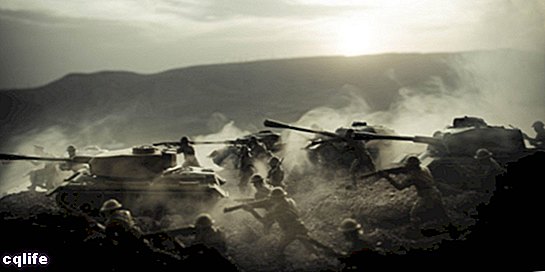- What is a conflict?
- Causes of the conflict
- Elements of the conflict
- Types of conflicts
- Examples of conflicts
- How to solve a conflict?
We explain what a conflict is, its elements and what types of conflicts exist. Also, why they occur and multiple examples.
The scarcity of resources is a trigger for conflicts.What is a conflict?
A conflict is a fight, dispute or disagreement that occurs when two or more persons they have interests or opinions that cannot be developed at the same time, that is, they contradict each other.
The conflict can occur in the field of relationships or at the social level when many people are involved or groups. It can manifest itself through an argument, misunderstanding, dispute, fight and even war, but the term “conflict” should not always be associated with theviolenceas it may or may not involve it.
For the resolution of a conflict, the parties in dispute have to reach an agreement or negotiation and, in some cases, accept that neither of the twoobjectives can be fully satisfied.
See also:Decision making
Causes of the conflict
The causes that trigger a conflict can occur individually or simultaneously (multi-causal conflict). Among the most representative are:
- Missing or failure in communication. A conflict arises between the parties due to a misunderstanding or lack of information. For example: A woman fights with her partner because she did not tell her that they had changed the meeting time.
- Disagreement of interests. A conflict arises between the parties because each of them seeks their own benefit or cover their need and this goes against the other party involved. For example: A country wants to obtain the sovereignty of a territory that has another country.
- Disagreement of values. A conflict arises because the parties involved differ in terms of beliefs, traditions or values. For example: Two people from religions different come into discussion because each defends its own tradition.
- Role mismatch. A conflict arises between the parties involved, since one of them claims or denounces an infringement of their rights for the benefit of the other party. For example: An employee asks his boss to respect his rest schedule.
- Inequalities. A conflict arises because one of the parties suffers a Social inequality or economic that you want to eliminate. Conflict situations often arise due to the scarcity of resources, although the abundance of a resource can also be a source of conflict. For example: A group of citizens claim the government for the rise of food.
Elements of the conflict
Every conflict must have certain elements:
- Actors. They are those people (two or more) who have opposing interests, opinions or needs in an area or on some point of view. Depending on the case, the actors intervene directly or indirectly.
- Trouble. It is what the people involved in the conflict differ about. It can be a specific problem or several simultaneously.
- Process. It is the way in which the conflict develops, the dynamics and relationships that exist between the actors, the demands and responsibilities, the predisposition for the resolution or not of the conflict, the processes of dialogues and negotiations and the possible consequences or manifestations that may derive from the lack of consensus.
Types of conflicts

First, conflicts can be classified according to the number of people involved in:
- Intrapersonal conflicts. They occur inside a person with himself. Generally, they occur due to the dissonance between feeling, thinking and doing.
- Interpersonal conflicts. They occur between two or more people, the participants have prejudices among themselves and are usually united by closer ties, many times the origin of these conflicts is related to emotional factors. They can be: unilateral, when only one of the parties has a complaint or dispute with another; or bilateral, when both parties want something.
- Group conflicts. They occur when the problem arises between groups of people for various reasons.
In turn, individual or group conflicts can be classified according to their characteristics in:
- Ideological conflicts. People or groups with opposing ideological or political positions, or who defend different interests, face each other. The differences in positions are usually very clear and in some cases they can turn into armed conflicts if one or both parties have or intend to do so. can.
- Religious conflicts. Different sectors within the same cult or members of different cults that oppose each other face each other. The disputes have to do with the interpretation of the corresponding scriptures or the doctrines that you choose to adopt. These conflicts had violent outcomes throughout the history.
- Political conflicts. Factions or sectors are confronted that try to obtain the political, economic and territorial power of a Condition. On some occasions, political conflicts trigger civil wars or armed conflicts between countries.
- Philosophical conflicts. People or groups with different interpretations of a topic, a school or a problem confront each other and many times eachviewexcludes the others. These conflicts do not usually generate major conflicts.
- Armed conflicts. They confront groups that are usually military or paramilitary that seek to obtain the power, territory or contested resource by force.
Examples of conflicts

Conflicts in interpersonal relationships
Thehuman relations inevitably involve various conflicts. From birth,Humans coexist and adapt within thefamily or the most intimate circles, where they acquire principles andvalues. Some examples of conflicts in this area are:
- A mother arguing with her teenage son because the young man does not want to study for the exam.
- A man arguing with another to get his place in line at the supermarket.
- A soccer player fights with another from the opposing team over a dangerous play.
- A neighbor rebukes another for damaging the fence.
- A driver conflicts with another when his car crashes on the avenue.
- One girl is upset with another because he punctured her in the park.
Social conflicts
Thesociology studies conflicts understood from another perspective: when they come from the very structure of thesociety. Economic inequalities, abuses of authority and disagreements between groups are the reasons most analyzed by thisscience. Some examples of conflicts in this area are:
- The workers of abusiness they organize collectively and express their demands to an employer.
- A dispute over territorial interests between the representatives of two neighboring countries.
- A strike carried out by the representatives of a labor union to ask for salary improvements.
- A meeting of signatures conducted by a non Governmental Organization in defense of the care of the green spaces of the city.
- A demonstration carried out by a group of neighbors to ask for greater security in their community.
- A conflict between a country and the boats that fish illegally in its seas.
How to solve a conflict?
There are certain steps or criteria that can be taken into account to work towards the resolution of a conflict.
- Recognize the situation. Know the parties involved and the root of the conflict. Determine what is causing a dispute, what are its causes.
- Look for alternatives. Having understood the conflict and its parts, it is important to analyze what can be done to try to reach an agreement. This point generally implies some resignation or acceptance of the different opinions.
- Propose solutions. Establish and propose communication with the parties involved to discuss possible options or resolutions. In some areas, this instance is known as negotiation and it is possible to have a mediator who acts as an intermediary between the parties.
- Listen to others. It is advisable to adopt an attitude of listening and reception to know the point of view of the other and the possible alternatives of action that they can propose.
- Achieve consensus. The final objective of this process is for both parties to find an alternative that benefits and harms both equally or similarly.
